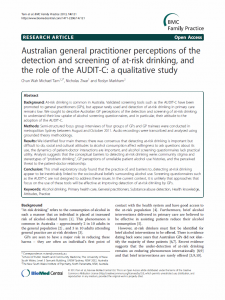 This article was preliminarily published in BMC Family Practice on 20 August 2013. The final web and PDF versions were published on 3 September 2013.
This article was preliminarily published in BMC Family Practice on 20 August 2013. The final web and PDF versions were published on 3 September 2013.
BMC Family Practice is an open access publisher and the full online and PDF versions are available from the above link. You can contact the corresponding author, C W Michael Tam on: m.tam (at) unsw.edu.au.
Abstract
Background
At-risk drinking is common in Australia. Validated screening tools such as the AUDIT-C have been promoted to general practitioners (GPs), but appear rarely used and detection of at-risk drinking in primary care remains low. We sought to describe Australian GP perceptions of the detection and screening of at-risk drinking; to understand their low uptake of alcohol screening questionnaires, and in particular, their attitude to the adoption of the AUDIT-C.
Methods
Semi-structured focus group interviews of four groups of GPs and GP trainees were conducted in metropolitan Sydney between August and October 2011. Audio recordings were transcribed and analysed using grounded theory methodology.
Results
We identified four main themes: there was consensus that detecting at-risk drinking is important but difficult to do, social and cultural attitudes to alcohol consumption affect willingness to ask questions about its use, the dynamics of patient-doctor interactions are important, and alcohol screening questionnaires lack practical utility. Analysis suggests that the conceptual barriers to detecting at-risk drinking were: community stigma and stereotypes of “problem drinking”, GP perceptions of unreliable patient alcohol use histories, and the perceived threat to the patient-doctor relationship.
Conclusion
This small exploratory study found that the practice of, and barriers to, detecting at-risk drinking appear to be inextricably linked to the sociocultural beliefs surrounding alcohol use. Screening questionnaires such as the AUDIT-C are not designed to address these issues. In the current context, it is unlikely that approaches that focus on the use of these tools will be effective at improving detection of at-risk drinking by GPs.
